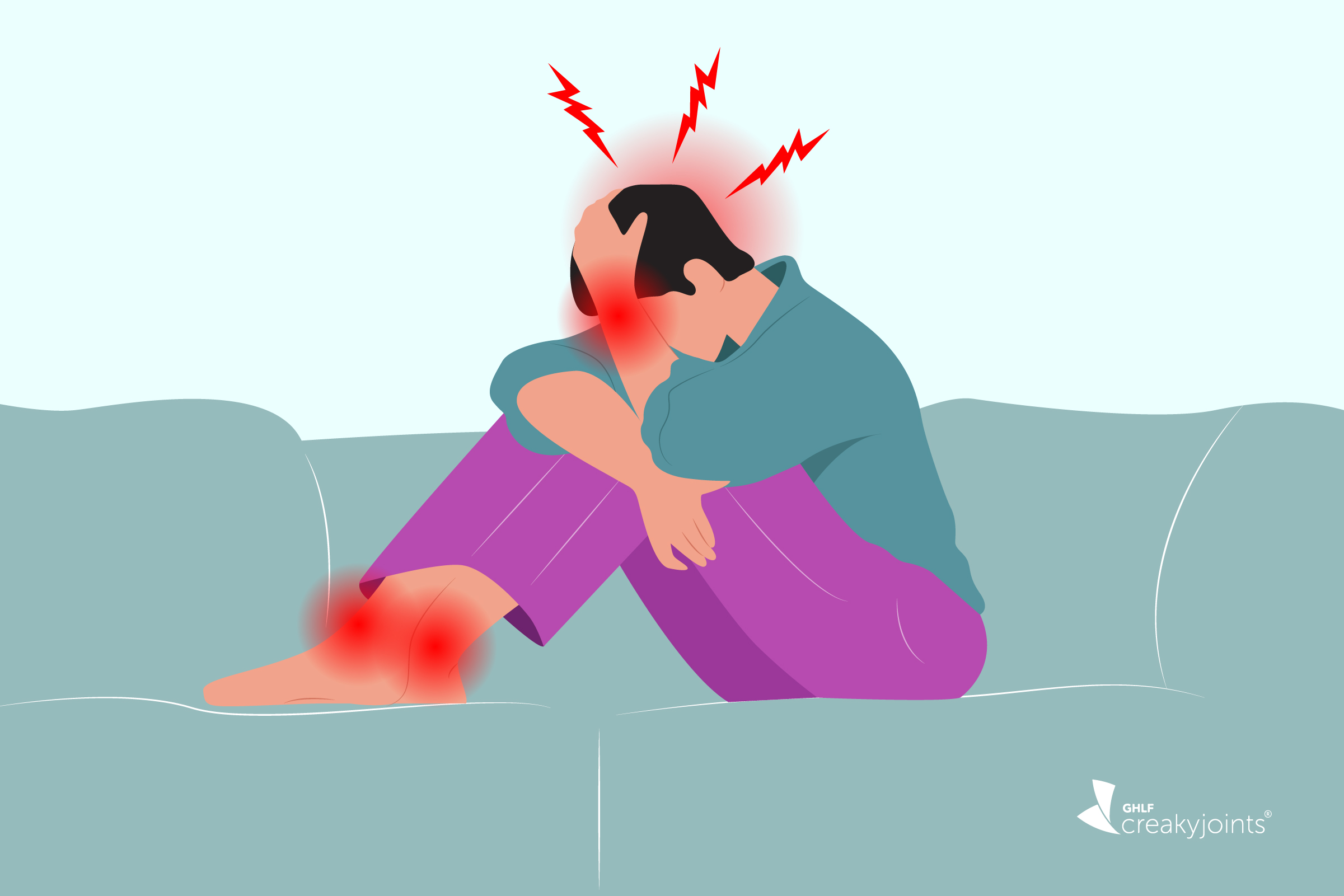Discover the symptoms of brain fog linked to migraine and learn coping strategies to manage cognitive challenges.
HAVE YOU TRIED…? SOME OF THE WORST THINGS YOU CAN SAY TO A MIGRAINE PATIENT
HAVE YOU TRIED…? SOME OF THE WORST THINGS YOU CAN SAY TO A MIGRAINE PATIENT
May 16, 2018
Jamie Sanders

It feels like migraine patients have been given remedies, cures and suggestions that will help them since the beginning of time. Most of the time these “tips” are things we have already tried, or simply old wives’ tales passed down from someone’s uncle’s cousin’s great-grandmother.
I asked my closest migraine friends and advocates to share some of the most annoying or ridiculous things they were told to do to remedy their migraine. I hope that by sharing these experiences, it will help people without migraine disease understand how frustrating it is to have such a misunderstood disease. Here is what they openly shared:
Having a baby/hysterectomy will cure your migraine.
“…A neuro[logist] asked if I was planning on getting pregnant because sometimes it changes the pattern of migraine attacks. My response – there’s no data to prove that and then I’d have a crying baby and chronic migraine. Idiot.” – Katie Golden, Golden Graine
“I had a similar experience to Katie’s. A male doctor who was the PCP for my whole family and who I’d known for years joked that I just needed to get pregnant. He was absolutely joking, especially since we knew each other so well, but I was 19 or 20 [and] not ready to have a baby and in a lot of pain. I didn’t find it funny.” – Michelle Tracy, The Migraine Warrior
“I was told by several female family [members]/friends if I were to get a hysterectomy my hormones wouldn’t be a major issue and my migraine attacks would stop. For one, I know several women in the migraine community that have actually gotten more issues with migraine PLUS every article I’ve come across does not fully support that as an option for treatment.” – JP Summers, Adventures of A Spoonie Mom
Some may foolishly believe that getting pregnant or having a hysterectomy will either lower the frequency of migraine attacks or stop them altogether. Although hormonal changes can, and many times do, affect or trigger migraine attacks, suggesting that being pregnant or having a major surgery to cease them is not the answer. For example, I had a three-month long intractable migraine during the first trimester of my last pregnancy. Obviously, being pregnant didn’t help me at all. What adds insult to injury is hearing this “advice” from physicians.
Have you tried [insert remedy here]?
“I went to pick up a prescription for ketamine and the girl at the pharmacy asked me if I had ever tried Excedrin Migraine. Lady, if I’m here to get ketamine, don’t you think I’ve already tried that?” – Katie Golden
“Some of the more interesting remedies I’ve been hipped to are [trying] eucalyptus in the shower or taking a shower before bed using a baby vapor bath. ‘Go for a walk, fresh air is all you need. Have you tried yoga for migraine? It really helps because it’s just tension. All you have to do is stretch it out!’ ‘Focus on your breathing’ and my personal favorite, ‘You need to relax’.” – Chantalle Marcial, Patient Advocate, 50-State Network
Asking us if we have tried any of the over-the-counter migraine medications is one, if not the worst, things we hear. Trust me when I say that they have been tried and exhausted many, many years ago. And just like any pain medication, taking it too often can lead to medication overuse headache which could potentially make someone who is episodic become chronic. And suggesting that we avoid common sense things or try something you read off the internet most likely will not help us.
Are you doing enough?
“I decided to go to urgent care after a severe attack caused me to vomit, which I rarely do anymore. Normally, I would stay home and power through it, but if I’m throwing up then it’s bad. The doctor on call happened to be the one that I didn’t like. She was cold, rude, and unsympathetic. She made it a point to tell me that I have been to urgent care too many times over the last few months and asked me if I am doing everything I can to fix my problem. Well, that sent me over the edge. I had to tell her that I have had migraine for over 30 years and have tried and failed practically every medication I was prescribed. I am allergic to most of the triptans and NSAIDS limiting my options for pain medications. I had a neurostimulator implanted in my head, receive Botox injections every three months, changed my diet, tried acupuncture, massage therapy, meditation and chiropractic adjustments. Yeah, I think I have done more than necessary to not be in pain. I was so frustrated that I was in tears which only made my pain worse.” – Jaime Sanders, The Migraine Diva
Having to go through our entire medical history to prove that we are doing or have done everything we can to treat our migraine is absurd. Especially with a health professional. Asking anyone if they are doing everything to manage their disease is rude and hurtful. We don’t like being in pain all the time so why wouldn’t we be trying everything?
Not believing our pain is real.
“I had what was basically a cluster migraine, though they wouldn’t call it that because [the] ‘majority of those cases are in men, not women’. I was in the emergency department and given Motrin through an IV for the pain…it did nothing. I was sent up to be observed for 24 hours and they gave me magnesium. That’s it. Nothing for pain management, just magnesium. Later they added vitamin B2. It was a horrible experience.” – Chantalle Marcial
It is extremely common for our pain to be diminished or have our experiences invalidated. This results in receiving inadequate treatment or none whatsoever. Responses like the one Chantalle received deters us from seeking emergency treatment because her experience is way too common and happens way too often. Why should we suffer more in the hands of health professionals when we can just suffer at home?
But you were fine yesterday.
“The other annoying thing I hear all the time is ‘But you were just fine yesterday. How can you all the sudden be stuck in bed. Just suck it up, take aspirin and put sunglasses on. You’ll be fine once you’re out of the house.’” – JP Summers
“For me, it’s the disappointment in their voices. ‘You seemed so happy yesterday. You went to the pond and took off your sunglasses. You got ice cream and didn’t throw it up. You wanted ice cream in the first place. I thought you were better. I had really hoped that you were better.’ And even though that sounds nice, maybe even supportive, all I want to do when I hear that is to never leave my bed again because that way I won’t disappoint anyone… well, other than myself.” – Michelle Tracy
Guess what? We have days when we can be “normal” and then be extremely sick and bed-ridden the next. That’s the life of a person living with migraine. Telling that person to just “suck it up” as JP explains is downright insensitive. And even though the person telling Michelle that she was fine the day before was coming from a good place, it just made her feel like she disappointed someone she loved because she couldn’t be the person she was yesterday today.
Michelle adds, “Then there’s the idea of ‘You overdid it. You should have done a better job pacing yourself’. But how do you pace yourself when you don’t know how much time you have left before the beast comes back to drag you back into the cave? How do you say no to all the things when you never know when you’ll be able to do them again?”
“My experience is that when I am around my extended family, I get handled with care as if I’m breakable and unable to be normal. I know they mean well but it frustrates me. I keep getting asked if I am okay and if I need to sit down. Also, being told that they pray for me every day. I just want to have fun and enjoy the company of my family. Instead I am reminded constantly of how sick I am.” – Jaime Sanders
You need to try this diet.
“Definitely being told not to juice as much or to eat more. General unsolicited diet advice from people who don’t even know the name of my syndromes and why solid food is difficult to digest. [Hearing] what to and not to eat. I must eat this way because it is conducive to my health and what my body can handle. I know my diet isn’t that of an average person’s. Diet is something I’m super careful with and work with five professionals about. I work overtime to address my dietary needs and follow strict guidelines to promote my health. It makes me feel very high maintenance and self-conscious when people feel like my diet or weight are open for discussion and input.” – Olivia Rehberger, Invisibly Enhanced
As migraine patients, we are very aware of what it is that we can and cannot eat. Food triggers are abundant, and we must keep a stealth eye on what we put into our bodies. And with so many dealing with the extreme nausea and vomiting associated with migraine, keeping down solid foods is almost, if not entirely, impossible. Trust us when we say that we eat the way that we do for a reason and suggesting the current diet trend or what you may have read somewhere is not going to fix our disease state.
Overall, we just want to go through each day without being force-fed ideas, suggestions, or opinions. What you are about to solicit to us we have most likely already heard hand over fist. We are experts about our disease. We know how to best manage it because we are the ones living with it. Life with migraine is already very hard. Having to filter through so many unsolicited remedies or being made to feel like a disappointment only makes it harder. Migraine is a very complicated disease. The last thing we want are unnecessary intrusions making it worse. So be thoughtful before you speak and consider how you would feel if you were in our shoes. All we want at the end of the day is compassion and understanding.
SUBSCRIBE TO GHLF
RELATED POST AND PAGES
_
Was this article helpful?
YesNo





This Post Has 0 Comments